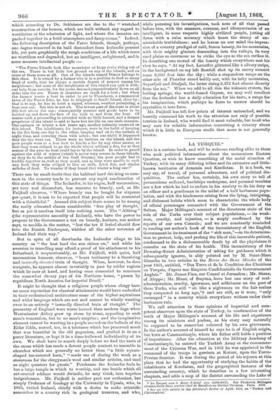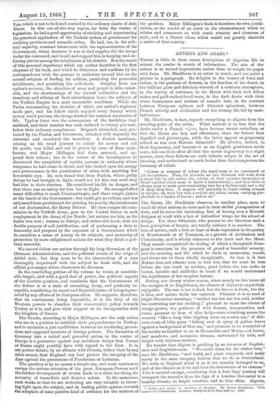LA. TURQI_UE.*
Tins is a curious book, and will be welcome reading alike to those who seek political information about the momentous Eastern Question, or wish to know something of the social situation of Turkey, with its many differing tribes and its extensive and little- known territories of Armenia and Kurdistan. It is a book, we may say, of travel, of personal adventure, and of political dis- quisition. The author has, certainly, his own story to tell of persecutions suffered, hardships undergone, and personal troubles not a few which he had to endure in his anxiety to do his duty as an officer and a gentleman in the midst of a half barbarous popu- lation, and with the hindrances arising from the lying, intriguing, and dishonest habits which seem to characterize the whole body of official personages connected with the Government of the Sultan. Major Millingen's account of the disastrous state of the rule of the Turks over their subject populations, — its weak- ness, cruelty, and injustice, — is amply confirmed by the reports of our own Consuls ; and we are constantly reminded in reading our author's book of the inconsistency of the English Government in its treatment of the "sick man,"—in its determina- tion to protect, help, and prolong the life of this incurable patient, condemned to die a dishonourable death by all the physicians it consults on the state of his health. This inconsistency of the Downing-Street Administration of asking for guidance which it subsequently ignores, is ably pointed out by M. Saint-Marc Girardin in two articles in the Revue des Deux Mendes of the year 1861, entitled, "Des Tures et de la Condition des Chretiens en Turquie, d'apres une Enquete Confidentielle du Gouvernement Anglais." Mr. James Finn, our Consul at Jerusalem ; Mr. Skene, of Aleppo ; Blr. Blunt, of Smyrna, have but one story of mal- administration, cruelty, ignorance, and selfishness on the part of these Turks, who still "sit like a nightmare on the fair realms they conquered so long ago,"-f and are still, as it were, "only encamped" in a country which everywhere withers under their barbarous rule.
We call attention to these opinions of impartial and com- petent observers upon the state of Turkey, in confirmation of the truth of Major Millingen's account of his life and experience among its ministers and pachas, as his story may naturally be supposed to be somewhat coloured by his own grievances. In the author's account of himself he says he is of English origin, but born at Constantinople, where his father still holds a position of importance. After his education at the Military Academy of Constantinople, he entered the Turkish Army at the commence- ment of the Crimean War, and in 1862 he was appointed to the command of the troops in garrison at Kotour, upon the Turco- Persian frontier. It was during the period of his sojourn at this place that he had the opportunity of studying the habits of the inhabitants of Kurdistan, and the geographical features of the surrounding country, which he describes in a few interesting chapters, and adds a map of the district surrounding the Lake of
• La Turquie sous le Regne el' Abdul Azis (1862-1867). Par Frederick Millingen (Osman-Seify-Bey), ancien Chef de Bataillon au Service Ottoman. Paris. 1868. t See an able article in the Edinburgh Review of April, 1850, on "Turkey and Christendom."
Van, which is not to be found marked in the ordinary charts of Asia Minor. In this out-of-the-way region, far frdm the centre of legislation, he had a good opportunity of studying and experiencing the practical application of the Turkish system of government for outlying provinces and nomadic tribes. He had, too, in his mili- tary capacity, constant intercourse with the representatives of the Government, whose business it was to find supplies for the troops under his command, and to aid and support him in keeping and en- forcing justice among the inhabitants of his district. It is the result of this personal experience which our author describes in the first -chapters of his book, and which he illustrates and confirms by his correspondence with the persons in authority around him on the several subjects of feeding his soldiers, protecting the peaceable inhabitants, and punishing the evil-doers. Judging from our author's account, the situation of army and people is alike miser- able, and the shortcomings of the central authorities and the treachery and villainy of their subordinates leave the subjects of the Turkish Empire in a most unenviable condition. While the Pacha commanding the division of which our author's regiment made part, and his fellow chiefs enjoyed every luxury which money could procure, the troops wanted the common necessaries of life. Typhus fever was the consequence of the hardships they endured, and their number was soon reduced to twenty per cent. below their ordinary complement. Brigands abounded, and, pro- tected by the Pachas and Governors, attacked with impunity the -caravans and murdered the travellers. A Jewish merchant, -coming on his usual journey to collect his money and sell his goods, was killed and cut in pieces by some of these male- factors, and Major Millingen had them arrested, and ex- posed their crimes ; but in the course of the investigation he discovered the complicity of certain persons in authority whose vengeance he had cause to dread, and who looked upon his energy and perseverance in the punishment of crime with anything but favourable eyes. He soon found that these Pachas, whose guilty -doings he had brought to light, would not let him rest until they had him in their clutches. He considered his life in danger, and that there was no safety for him but in flight. He managed after many difficulties to reach Constantinople, and there sought justice at the hands of the Government ; but could get no redress, and was nnlysaved from punishment for quitting his post by the interference nf our Ambassador, Sir Henry Bultver. He then resigns his com- mission in the Turkish Army, goes to the United States to seek employment in the Army of the North ; but arrives too late, as the battle was won ; returns to Europe, and writes this book, with the -double purpose of self-justification, and of performing a duty to humanity and progress by the exposure of a Government which he considers a cause of misery to its subjects, and unworthy of protection by more enlightened nations for what they think a poli- tical necessity.
We cannot follow our author through his long discussion of the Ottoman Administration, and the political events of the reign of Abdul Aziz ; but they seem to be the observations of a man thoroughly acquainted with the subject he deals with, and the -official personages whose characters he discusses.
In the concluding portion of the volume he treats at consider- able length, and with a good deal of power, the political aspects of the Eastern question, and concludes that the Government of the Sultan is in a state of crumbling decay, and perfectly in- capable, considering its moral and financial status, of being regene- rated by any efforts of its European allies. He suggests, therefore, that its continuance being impossible, it is the duty of the Western powers to abandon their conservative policy towards Turkey as it is, and give their support to its incorporation with the kingdom of Greece.
The Greeks, according to Major Milliugen, are the only nation who are in a position to establish their preponderance in Turkey, and to maintain a just equilibrium between the conflicting preten- sions and supposed interests of foreign powers. The formation of Germany into a united and powerful nation in the centre of Europe is a guarantee against any ambitious design that France or Russia might possibly have with regard to the East. It is, our.author thinks, by an alliance with Prussia, rather than by any other means, that England can best protect the integrity of the East against the pretentions of Panslavism or Latinism.
The question is by no means a simple one, and must continue to -occupy the serious attention of the great European Powers until the further development of events leads to a crisis involving the necessity of immediate and decisive action. In the meantime, such works as that we are reviewing are very valuable in throw- ing light upon the subject, and in leading public opinion towardsBy Henry Blackburn. With the adoption of some positive kind of evidence for the solution of numerous Illustrations. London: Sampson Low, Son, and Co. 1868.
the problem. Major Millingen's book is therefore its own justifi- cation, as the record of an actor in the circumstances which he relates and comments on with much vivacity and clearness of style, and in a French idiom which would not greatly discredit a native of that country.































 Previous page
Previous page